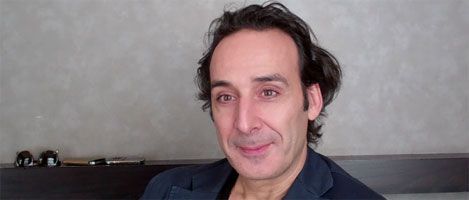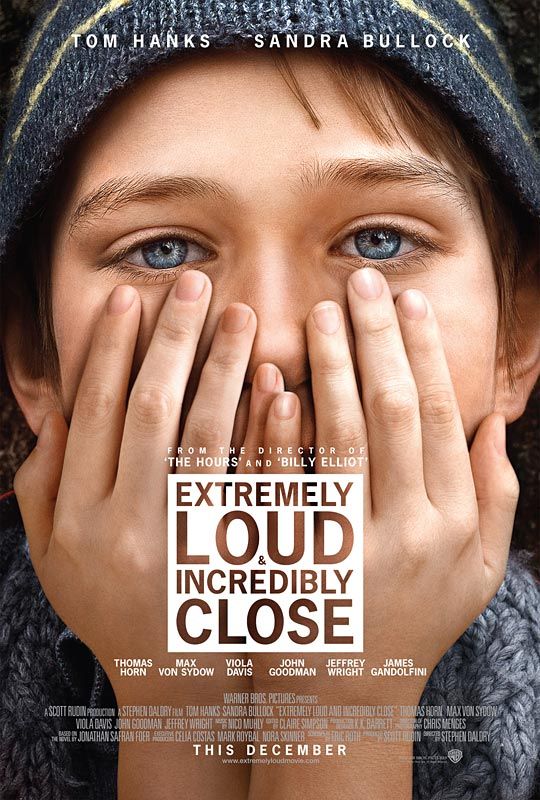Over the last few years, composer Alexandre Desplat has gone from genre to genre and consistently delivered fantastic scores. Here's a few that he's done since 2009: Fantastic Mr. Fox, A Prophet, The King's Speech, Harry Potter and the Deathly Hallows - Part 1 and Part 2, The Ghost Writer, The Ides of March, Carnage, and, most recently, director Stephen Daldry's Extremely Loud and Incredibly Close. With his ever expanding resume and the fact that he records rather quickly for a composer, he's rapidly become one of the biggest composers in Hollywood. As a big fan of his work, it's great to see.
The other day I got to sit down with Desplat for an extended interview. During our wide ranging conversation, we talked about what the past few years have been like, his writing process, what it's like to work with some of the biggest directors in the world, how he picks his projects, his favorite scores that he didn't write, and how he got involved in Extremely Loud and Incredibly Close (which he did in three weeks!). In addition, we talked about his work on the final two Harry Potter films, Twilight: New Moon, and Wes Anderson's Moonrise Kingdom, which he finished last month. Hit the jump for more.
As usual, I'm providing a time index of the interview so you can watch the parts that interest you. The video is further down the page.
Alexandre Desplat Time Index
- 0:20 – Talks about excitement and desire being the key to how he was able to work on so many incredible films over the past few years. A self-professed “movie maniac,” Desplat talks about his dream coming true in building a career that combines music and cinema.
- 1:40 – Talks about his writing process for composing scores. His experience in writing for theater, TV shows and short movies trained him to write fast.
- 3:30 – Discusses the score for Extremely Loud and Incredibly Close, which he wrote in three weeks.
- 4:25 – Reflects on the short deadline for Extremely Loud and Incredibly Close.
- 5:25 – Comments on pianist Jean-Yves Thibaudet, who had an even crazier schedule.
- 6:25 – Reflects on his decision to score the movie based on his desire to work with director Stephen Daldry.
- 8:00 – Discusses the manner in which he has collaborated with various directors, such as Roman Polanski, George Clooney and Daldry.
- 11:30 – Talks about Daldry’s emotional involvement in the film and how it affected the score.
- 12:15 – Desplat discusses obsessing over the details and prefers a director that works the same way.
- 13:45 – Discusses his work on Harry Potter and the Deathly Hallows – Part 2.
- 14:25 – Talks about finishing the series that his idol John Williams had started.
- 15:00 – Comments on the thematic elements of Harry Potter and the Deathly Hallows – Part 2, specifically Lily’s theme and how it permeates the entire story.
- 15:50 – Talks about Mai Fujisawa, the singer for Lily’s theme in the film.
- 17:15 – Discusses working with Wes Anderson on Moonrise Kingdom.
- 18:25 – His familiarity with Anderson’s previous works helped him to score Moonrise Kingdom.
- 19:20 – Comments on Anderson’s style of mixing obscure songs with a unique, intricate and organic score.
- 21:10 – Talks about some music of his that has not been released anywhere.
- 21:20 – Comments on how he’s looking forward to working on his “golden album” which will be released with some rare soundtrack recordings.
- 22:20 – Discusses his work with director Chris Weitz on New Moon and past difficulties on The Golden Compass.
- 23:30 – Mentions that his average time to finish a score is 3-4 weeks; otherwise, he wouldn’t have been able to do as many movies in recent years.
- 24:30 – Remarks on projects that he’s turned down because they didn’t resonate with him based on a number of reasons.
- 26:00 – Comments on his lack of a “comic book movie” in his repertoire and his upbringing devoid American comics.
- 26:55 – Talks about scores over the last few years that he has loved and wishes he was involved with, including works by Danny Elfman (Milk), Thomas Newman (Revolutionary Road) and Javier Navarrete (Pan’s Labyrinth).
- 28:07 – Remarks on how Catch Me if You Can should have won more awards.
- 28:30 – Talks about his upcoming works in 2012 which will feature a big score for DreamWorks.
- 28:50 – Remarks on the handful of directors who have kept the same composers throughout their career, notably Tim Burton and Elfman.
- 29:45 – Talks about how his schedule is already filled up beyond 2012.
- 30:20 – Comments on collaborations with other composers on past projects.


